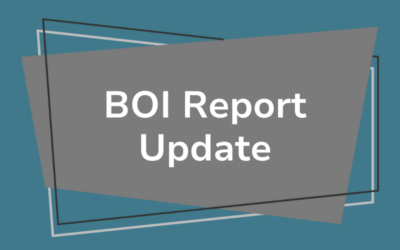Tax considerations are a significant factor in how entrepreneurs structure their businesses. The qualified business income deduction (or QBI tax deduction) is an important tax deduction that allows eligible businesses to deduct up to 20% of their qualified business income from their taxes. As a provision of the 2017 Tax Cuts and Jobs Act (TCJA), the QBI deduction was intended to help business owners of companies with pass-through tax elections lower their taxable income and receive additional tax benefits.
In today’s post, we’ll cover all the essential details you need to know about the qualified business income deduction.
Who Can Take the QBI Deduction?
Whether or not you can take advantage of the qualified business deduction depends on several factors, with one of them being the company’s legal entity. The QBI deduction is available to pass-through entities (or flow-through entities), such as sole proprietorships, partnerships, limited liability companies (LLCs), limited liability partnerships (LLPs), and S corporations. A company structured as a pass-through entity does not pay income tax of its own, as a corporation does. The company’s income, losses, deductions, and credits instead “pass-through” to each owner’s personal tax return. Then the profits are taxed per each owner’s individual income tax rate.
Taxpayers eligible to take the qualified business income deduction include sole proprietors, partners in a partnership, shareholders in an S corporation, and members of an LLC.
Who Cannot Take the QBI Deduction?
The C corporation is not a pass-through entity; and, therefore, is not eligible to take the qualified business income deduction. The corporation pays income tax on its earnings and pays its owners as employees of the company. The owners/employees must then pay taxes on their wages; an occurrence referred to as double taxation. Because of double taxation, many companies prefer to structure as a pass-through entity.
On the other hand, incorporating affords the company many tax benefits, including a flat-tax rate of 21% (another provision in the 2017 TCJA). Additional tax benefits of incorporating include deducting payroll taxes, medical benefits, and carrying losses over many years. As you can see, although C Corps cannot take the qualified business income deduction, there are other benefits available to make forming as a C Corp worthwhile.
In addition, there are “specified service trade or businesses (SSTB)” where the amount of income could make a business owner ineligible for the qualified business income deduction. If the owner’s 2021 taxable income is more than $429,800 (married filing jointly) or $214,900 (all others) and the business is an SSTB, you also cannot claim this deduction.
Per the IRS, an SSTB is a trade or business that performs services in:
- Health
- Law
- Accounting
- Actuarial science
- Performing arts
- Consulting
- Athletics
- Financial services
- Investing
- Investment management
- Trading
- Any business dealing in certain assets or any trade or business where the principal asset is the reputation or skill of one or more of its employees or owners
There is also an income cap for all other businesses (non-SSTBs) for the qualified business income deduction. For the 2021 tax year, the limit is $164,900 for single filers and $329,800 for joint filers. If you fall into this category, it’s crucial to talk to your account to learn if any of your income qualifies for the qualified business income deduction.
How Is QBI Deduction Calculated?
First, not all business income is considered qualified business income. Qualified business income is the company’s net profit, which is the net amount of the company’s income, gain, deduction, and loss. Income that does not qualify capital gains or losses, dividends, interest income, income earned outside the United States, and certain payments given to partners and shareholders.
The deduction is limited to the lesser of 20% of qualified business income, or 50% of the total W-2 wages paid by the business. (The wage limit does not apply if the taxable income is below 2021 income limits.) There is also a 20% deduction for qualified real estate investment trust (REIT) dividends and qualified publicly traded partnership (PTP) income.
What happens if the QBI is negative? If the net QBI for the tax year is negative, the qualified business income is treated as a QBL or Qualified Business Loss and is carried forward to the following tax year.
What States Allow QBI Deductions?
Although qualified business income deductions are allowed under federal law, some states have modified their state tax codes to either accept or deflect the 20% tax deduction. To understand how the QBI deduction affects your state income tax, check with your accountant or your state’s tax agency.
Should You Change Business Structure?
In most cases, the qualified business income deduction is not a reason to change a business structure from a corporation to a pass-through entity. And, once your business grows, you may find incorporating offers more tax and liability benefits. Plus, if you want to attract investors, incorporating makes your company more attractive to investors as they get a share of the business without liability.
Have more questions about which business structure is right for your business? Contact a CorpNet advisor today!
References
https://www.irs.gov/newsroom/qualified-business-income-deduction





